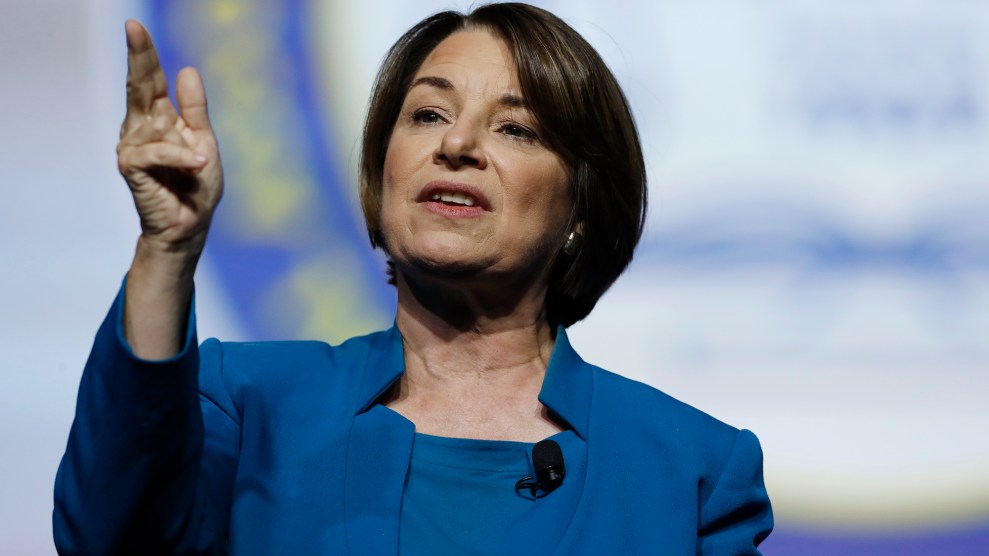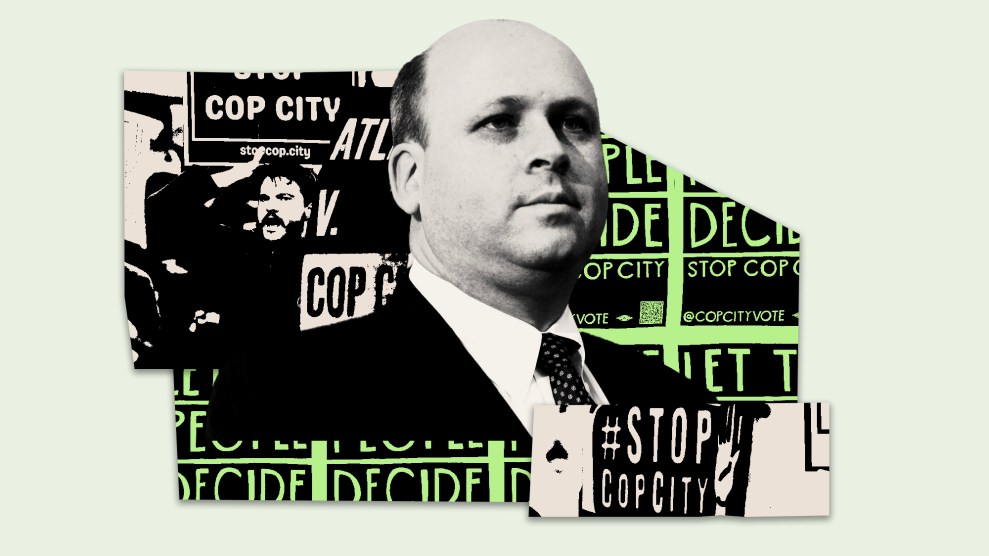
Sen. Amy Klobuchar speaks during a candidates forum at the 110th NAACP National Convention in Detroit. Carlos Osorio/AP
At an NAACP forum for presidential candidates in Detroit on Wednesday, Sen. Amy Klobuchar was asked whether she believed federal prosecutors should have pressed charges against a New York police officer who killed Eric Garner in 2014 after putting him in an illegal chokehold. “That is for the justice system to decide,” she said, and “I know it went through a number of attorney generals, but I thought that what happened there…” Before she could go on, she was interrupted by some loud noises from the crowd.
Klobuchar, a former prosecutor in Minnesota, paused for a moment and then continued. “If you would just let me finish, I thought it was an outrageous situation,” she added. “I watched that video and it just tears your heart to see what happened.”
At least two other candidates at the forum were asked a similar question. But only Klobuchar’s response elicited an interruption. She “is really not getting great reception at this #NAACP Convention,” Justin Onwenu, an environmental organizer in Detroit, tweeted after her response, adding that she was almost booed by the crowd. Her comment—that it should be up to the “justice system to decide” about Garner’s case—raised questions about the extent to which a Justice Department under her administration would have handled the prosecution differently than it was handled by the Trump administration.
Earlier this month, at the decision of Attorney General William Barr, federal prosecutors announced they would not press charges against Officer Daniel Pantaleo in the case, despite repeated recommendations from the Justice Department’s civil rights division to do so. Garner, who had been stopped by police for selling untaxed cigarettes on a Staten Island sidewalk, repeatedly told officers that he couldn’t breathe as Pantaleo held him to the ground, and his death sparked protests around the country over police brutality against people of color. The department’s latest decision not to charge Pantaleo came almost five years to the day after Garner was killed, and it was swiftly condemned by many of the leading Democratic presidential candidates. Sens. Kamala Harris, Cory Booker, Elizabeth Warren, and Bernie Sanders were among those who put out statements on Twitter decrying a lack of justice for Garner’s family. Joe Biden, who has faced criticism for his history on racial justice and his role in the 1994 crime bill, did not. Neither did Klobuchar.
Klobuchar has struggled to court black voters and defend her record on criminal justice reform. As the top prosecutor in Minnesota’s most populous county during the early 2000s, she did not press charges in more than two dozen cases where people were killed by police, but her office regularly went after low-level offenses like vandalism and pushed for long prison sentences, a practice that critics say disproportionately harmed people of color. “We were already a community in distress when she became Hennepin County attorney,” Nekima Levy Armstrong, a civil rights attorney and former president of the Minneapolis chapter of the NAACP, told the Washington Post, which investigated Klobuchar’s record on officer-involved killings. “Rather than taking steps to help mitigate some of those concerns and issues, during her tenure in office, her policies exacerbated the situation.”
The NAACP forum was an opportunity for some leading Democratic presidential candidates to elaborate on thoughts about Garner’s case, during one-on-one discussions with a moderator that spanned issues ranging from reparations to housing and income inequality. When asked whether he would have brought charges against Pantaleo, Booker, who has made criminal justice reform a focal point of his campaign, was applauded after he told the moderator that he would have.
Harris, a former prosecutor who faced criticism for her office’s handling of police-involved killings when she was California’s attorney general, did not directly answer yes or no to that question. But she said that if she were elected, “the civil rights division of the United States Department of Justice [would] have priority in terms of weighing in on what these cases should be.” She added that she had met with Garner’s mother the day before. “Part of what is wrong with what happened and also the way that this happens every day in America is we have to honor the grief of a mother and give her the dignity she deserves,” Harris said.
While a president may not be directly involved in deciding whether federal prosecutors should press charges in cases like this, their choice of an attorney general can be crucial, as was clear during the nearly five years that the Justice Department considered how to handle the officer who killed Garner. Under the Obama administration, Attorney General Eric Holder stated that he believed the federal government should press charges. When Loretta Lynch later took the post, she initially disagreed with that assessment, but Vanita Gupta, who led the civil rights division of the Justice Department at the time, changed her mind. After Trump was elected and Jeff Sessions was appointed as attorney general, civil rights prosecutors continued to recommend that the government bring charges, but Rod Rosenstein, then deputy attorney general, did not pursue the case. Under Barr, prosecutors in New York argued there was not enough evidence to prove the officer had willfully used excessive force, and Barr agreed.
On Thursday, Klobuchar addressed her history of not pressing charges against police officers. At a forum in Indianapolis hosted by the National Urban League, a civil rights organization focused on issues affecting African Americans, she said that when she worked as a prosecutor this decision was usually made by a grand jury, and that she now supported prosecutors taking more ownership over the choice of whether or not to prosecute in these cases. She also called for changes at the Justice Department and said that if she were elected she would “make a major priority for the civil rights division to have a major say and weigh in on these kinds of cases, because not enough of that is going on right now obviously under this president and this attorney general.”
The Garner family has suffered too much. This decision pains me. It is not just, and we will not have real justice for black Americans until there is serious reform of our racist criminal justice system. https://t.co/U3wZiXJDg1
— Bernie Sanders (@BernieSanders) July 16, 2019
This is a miscarriage of justice. Our criminal justice system should be rooted in accountability. My heart breaks for the Garner family.https://t.co/qwSVbXdzSc
— Kamala Harris (@KamalaHarris) July 16, 2019
This is an injustice. We have a responsibility to protect our citizens—and to hold police accountable when they fail. No one is safe in a country with a broken criminal justice system. My heart goes out to Eric Garner's family today. https://t.co/z6c6xaGn94
— Elizabeth Warren (@ewarren) July 16, 2019
This decision is wrong, unjust and painful reminder of just how broken our criminal justice system is. Eric Garner should be alive today. I pray his loved ones can find peace. https://t.co/WChz5ds334
— Cory Booker (@CoryBooker) July 16, 2019














